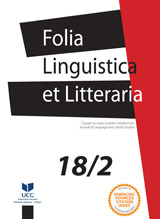EINFLUSS DER POLITIK AUF DEN DAF-UNTERRICHT IN BIH WÄHREND DER REGIERUNG DER ÖSTERREICHISCH-UNGARISCHEN MONARCHIE
THE IMPACT OF POLITICS ON THE TEACHING OF GERMAN AS A FOREIGN LANGUAGE IN B&H DURING THE RULE OF AUSTRO-HUNGARIAN MONARCHY
Author(s): Sanja R. RadanovićSubject(s): Foreign languages learning, Political history, Evaluation research, 19th Century, Pre-WW I & WW I (1900 -1919)
Published by: Filološki fakultet, Nikšić
Keywords: Austro-Hungarian monarchy; textbooks; readers; exercise books; German as a foreign language; German as a mother tongue; the number of class hours;
Summary/Abstract: During the reign of Austro-Hungarian Monarchy in Bosnia and Herzegovina (1878-1918) German language was important in the educational system of this country. It was one of the subjects with the greatest number of class hours in the curriculum. German language textbooks used in Bosnian-Herzegovinian schools, especially readers, were printed mainly in Vienna and intended for schools in Austria, i.e. for teaching German as a mother tongue. Two facts stand in the foreground: a large number of German language class hours, and textbooks intended for teaching German as a mother tongue. They allowed German language teaching to be in the service of the ruling policy of the Austro-Hungarian monarchy, and to be a setting where the regime could spread their ideas. These facts will be the focus of this paper. The aim, therefore, is to show how the Austro-Hungarian monarchy used German language for the establishment and implementation of its rule, which ideas were spread and for what purpose.
Journal: Folia Linguistica et Litteraria
- Issue Year: 2017
- Issue No: 18/2
- Page Range: 159-171
- Page Count: 13
- Language: German

